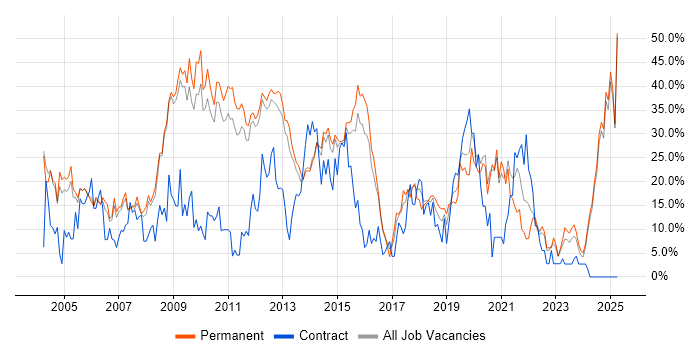SQL (Structured Query Language)
Surrey > Epsom
The table below provides summary statistics for permanent job vacancies advertised in Epsom requiring SQL skills. It includes a benchmarking guide to the annual salaries offered in vacancies that cited SQL over the 6 months leading up to 16 May 2025, comparing them to the same period in the previous two years.
| 6 months to 16 May 2025 |
Same period 2024 | Same period 2023 | |
|---|---|---|---|
| Rank | 2 | 24 | - |
| Rank change year-on-year | +22 | - | - |
| Permanent jobs citing SQL | 42 | 3 | 0 |
| As % of all permanent jobs advertised in Epsom | 52.50% | 2.48% | - |
| As % of the Programming Languages category | 89.36% | 25.00% | - |
| Number of salaries quoted | 42 | 3 | 0 |
| 10th Percentile | £43,875 | - | - |
| 25th Percentile | £62,500 | £63,750 | - |
| Median annual salary (50th Percentile) | £70,000 | £67,500 | - |
| Median % change year-on-year | +3.70% | - | - |
| 75th Percentile | £72,500 | £71,250 | - |
| 90th Percentile | £85,375 | - | - |
| Surrey median annual salary | £62,500 | £50,000 | £57,500 |
| % change year-on-year | +25.00% | -13.04% | +3.60% |
All Programming Languages
Epsom
SQL falls under the Programming Languages category. For comparison with the information above, the following table provides summary statistics for all permanent job vacancies requiring coding skills in Epsom.
| Permanent vacancies with a requirement for coding skills | 47 | 12 | 19 |
| As % of all permanent jobs advertised in Epsom | 58.75% | 9.92% | 25.00% |
| Number of salaries quoted | 44 | 12 | 18 |
| 10th Percentile | £44,125 | £47,500 | £37,750 |
| 25th Percentile | £62,500 | £56,875 | £41,250 |
| Median annual salary (50th Percentile) | £70,000 | £65,000 | £42,500 |
| Median % change year-on-year | +7.69% | +52.94% | -30.33% |
| 75th Percentile | £72,500 | £71,250 | £44,688 |
| 90th Percentile | £83,625 | £74,625 | £66,250 |
| Surrey median annual salary | £65,000 | £55,000 | £60,000 |
| % change year-on-year | +18.18% | -8.33% | +2.56% |
SQL
Job Vacancy Trend in Epsom
Job postings citing SQL as a proportion of all IT jobs advertised in Epsom.

SQL
Salary Trend in Epsom
3-month moving average salary quoted in jobs citing SQL in Epsom.
SQL
Salary Histogram in Epsom
Salary distribution for jobs citing SQL in Epsom over the 6 months to 16 May 2025.
SQL
Co-occurring Skills and Capabilities in Epsom by Category
The follow tables expand on the table above by listing co-occurrences grouped by category. The same employment type, locality and period is covered with up to 20 co-occurrences shown in each of the following categories:
